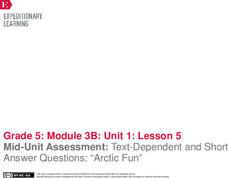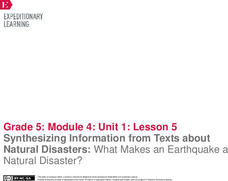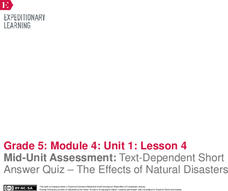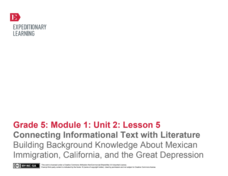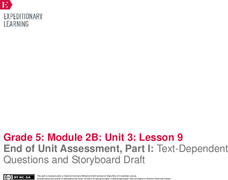EngageNY
Reading for Gist and Answering Text-Dependent Questions: Industrial Food Chain
Where do humans fall on the food chain? Scholars read about the Industrial Food Chain in The Omnivore’s Dilemma sections. They use word catchers to record unfamiliar words as they read and place sticky notes in the margins to annotate...
EngageNY
Reading for Gist and Answering Text-Dependent Questions: Local Sustainable Food Chain
Readers use sticky notes and a Reading Closely: Guiding Questions handout to record the gist of a different section (pages 161-166) in The Omnivore’s Dilemma. They then pair up and share their ideas. To end the lesson, readers complete...
EngageNY
Mid-Unit Assessment: Text-Dependent and Short Answer Questions: “Arctic Fun”
Let's have a little fun! Readers take a mid-unit assessment by answering text-dependent and short-answer questions using the text Arctic Fun. They then complete a form to track their progress in the unit thus far.
Curated OER
Studying Idioms and Word Meaning
Idioms are really confusing, but learning them will help your readers deepen their understanding of a variety of texts. This 11-slide presentation offers several examples (like "break a leg" and "mind your manners") to help readers use...
Curated OER
Mean, Median, Mode, and Range - Homework 14.3
For this data and statistics worksheet, students find the mean, median, mode, and range of 4 different sets of data. Next, students solve 1 word problem where they find the mean.
Curated OER
Word Meanings From Context
Here's a context clues learning exercise that provides practice or assesses the use of "a" words including alacrity, abrasive, acrimonious, abridged, alleviate, and more. Readers study the context and then select the best meaning from...
C3 Teachers
Women’s Rights: What Does It Mean to Be Equal?
A guided-inquiry lesson asks seventh graders to research the compelling question, "What does it mean to be equal?" Guided by three supporting questions, researchers complete three formative performance tasks and gather evidence from...
Curated OER
Using Wordless Comics To Help Create Meaning in Reading
Use picture cues as a tool in order to create meaning along with text. With a wordless comic, young illustrators discuss the main idea and character traits, and independently write a summary for a page of a wordless comic. This strategy...
Curated OER
Reading For Meaning
Select an article that explores people of another culture. After reading it as a class, distribute copies of this worksheet. It asks for a brief summary, encourages readers to make text-to-self connections, and asks learners to identify...
Curated OER
Comprehension: Answering Questions then Rereading the Text to Identify Details in Support of the Answers
Even first graders can be exposed to good reading strategies and comprehension skills. The teacher demonstrates how to read informational text, look at the questions, reread the text, locate answer, then locate supporting details to...
Curated OER
Comprehension: Compare and Contrast Topics in Two Texts
A scripted lesson can be a big help for new teachers. This fully scripted three-day learning activity provides teachers with the means to demonstrate how to compare and contrast two topics in two texts. Learners will work as a class to...
Curated OER
Comprehension Instructional Routine: Sequence of Events in Text
If you're looking for a detailed instructional activity on event sequencing from informational text, you've found it. There is an entire script for you to draw from as you explore order of events and sequence words. Scaffolding is key...
Curated OER
Locate Key Information in Nonfiction Text
Interpret nonfiction text with your class. Readers use key information found in nonfiction text to answer questions and problem solve. They utilize the chapter headings, diagrams, glossary, maps, and captions as well as the table of...
EngageNY
Mid-Unit Assessment: Text-Dependent and Short Answer Questions: Excerpts from “A Limited Supply”
There's no such thing as an unlimited resource. Scholars complete a mid-unit assessment by reading A Limited
Supply. They answer text-dependent questions and complete a graphic organizer about key terms in the text.
EngageNY
Using Informational Text Features and Learning Freaky Frog Vocabulary
What kind of text features help children build a strong vocabulary? Class members use text features such as headers to unpack new vocabulary words. They create vocabulary journals in which they will write what they think the definition...
Florida Center for Reading Research
Vocabulary: Words in Context, Meaning Maker
Support children with finding meaning in unknown words using this graphic organizer. While reading a piece of writing, learners identify unfamiliar words, using context clues and reference materials to find and record definitions before...
EngageNY
Synthesizing Information from Texts about Natural Disasters: What Makes an Earthquake a Natural Disaster?
Are all disasters natural? Scholars reread Earthquakes! to determine what classifies these events as a natural disaster. They label earthquake facts as N for natural or D disaster to support their ideas. They then discuss academic...
Statistics Education Web
Who Sends the Most Text Messages?
The way you use statistics can tell different stories about the same set of data. Here, learners use sets of data to determine which person sends the most text messages. They use random sampling to collect their data and calculate a...
EngageNY
Mid-Unit Assessment: Text-Dependent Short-Answer Quiz—The Effects of Natural Disasters
Readers complete a mid-unit assessment by reading the text How Do Hurricanes Form? They answer text-dependent questions about hurricanes with short answer and sequencing. Learners then participate in a read aloud and text chunking...
EngageNY
End of Unit 1 Assessment: Inferring and Synthesizing (From Two Texts) About Life in Colonial America
Close your colonial America unit with a performance-based assessment. Class members will show their proficiency in several skills including using details to back up inferences, determining the meaning of words in context,...
What So Proudly We Hail
The Meaning of America: Equality
What if society sought equality by handicapping the gifted and dispelling any traces of diversity? Kurt Vonnegut Jr. offers one possible answer to this question through his incredibly engaging and thought-provoking satirical...
EngageNY
Connecting Informational Text with Litearature: Building Background Knowledge About Mexican Immigration, California, and the Great Depression
Help your class transition as the setting in the novel Esperanza Rising, by Pam Muñoz Ryan, moves from Mexico to California. Beginning with prior knowledge, and moving into jigsaw research groups, class members add to and create posters...
EngageNY
End of Unit Assessment, Part 1: Text-Dependent Questions and Storyboard Draft: “You Can Do a Graphic Novel” Excerpt
Eyes on the finish line. Serving as the first part of the end of unit assessment, learners answer questions based on a text about how to write a graphic novel. Using what they've learned, they then create a storyboard about the invention...
Curated OER
Inferring Vocabulary Meaning
Explore the meaning of unknown words! Read All I See with your class, having them complete the inference chart provided while reading. They select unknown words, guess their meanings, and identify what other words or pictures helped them...
Other popular searches
- Inferring Meaning From Text
- Infering Meaning From Text
- Infer Meaning From Text
- Making Meaning From Text
- Constructing Meaning From Text




